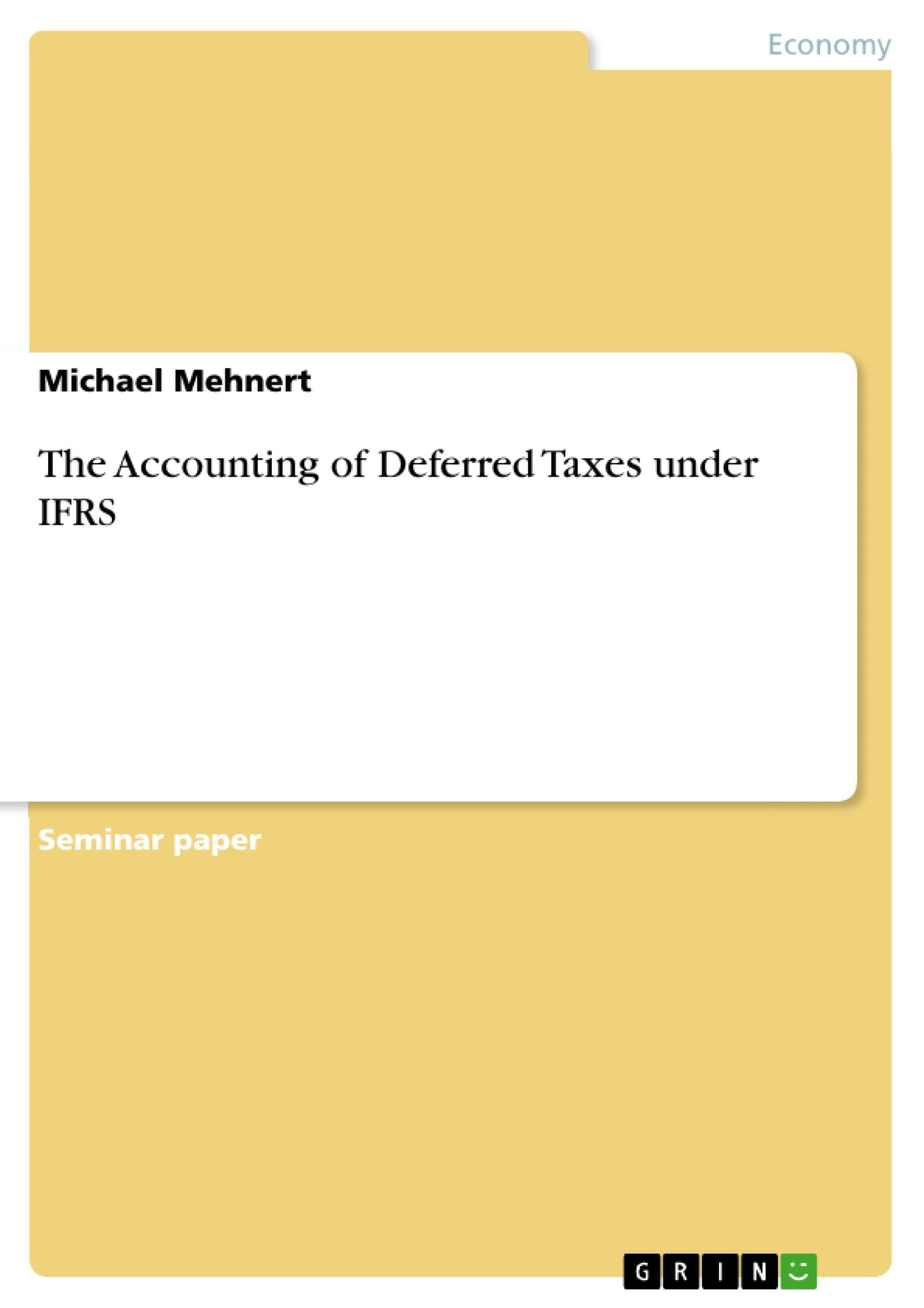1 Introduction
In a global economy there is a need for common accounting rules. It is simply important for an enterprise to know that national and international stock exchange rules require the application of internationally accepted accounting directives. So there are several good reasons for a trend towards internationalization. For an investor means internationaliza-tion usually accompanied by a standardization of accounting rules that he can compare financial statements quicker and easier. There are no longer time- consuming and ex-pensive conversions of financial statements necessary. Internalization means also that the national differences in the determination of profit will disappear. Standardization would give the term “profit” substance and would allow the comparison of financial statements of different enterprises from several countries.
In the European Union enterprises have a special responsibility since 2005. On the 12th of March 2002 the European Parliament endorsed the EC Commission’s proposal that all EU listed companies must follow standards issued by the International Accounting Standards Board (IASB) in their consolidated financial statements starting no later than 2005.
In this assignment I want to give a short overview about what the main principles of the International Financial Accounting Principles (IFRS) are all about and what differences to the German Statutory Accounting Rules (HGB) can be distinguished (chapter 2). Then I want to focus on the accounting of deferred taxes under IFRS (chapter 3). After a definition of deferral I want to explain the concepts and methods of deferral in this part. Finally I will have a closer look on deferred tax assets and deferred tax liabilities.
Inhaltsverzeichnis (Table of Contents)
- Introduction
- International Financial Reporting Standards
- Main objects and principles of the International Financial Reporting Standard
- Differences to the German Statutory Accounting Rules (HGB)
- Accounting of Deferred Taxes under IFRS
- Definition and function of deferred taxes
- Concept of Deferral
- Methods of Deferral
- Deferred Taxes Assets and Deferred Taxes Liabilities
- Conclusion
- Literature
- Abbildungsverzeichnis
- Tabellenverzeichnis
Zielsetzung und Themenschwerpunkte (Objectives and Key Themes)
This work aims to provide an overview of the International Financial Reporting Standards (IFRS) and their application to deferred taxes. The text focuses on the main principles of IFRS and contrasts them with the German Statutory Accounting Rules (HGB), highlighting the differences in their objectives and principles. It also explores the concept and methods of deferral, as well as the nature and management of deferred tax assets and liabilities.
- International Financial Reporting Standards (IFRS)
- Deferred Taxes under IFRS
- Comparison with German Statutory Accounting Rules (HGB)
- Concept and Methods of Deferral
- Deferred Tax Assets and Liabilities
Zusammenfassung der Kapitel (Chapter Summaries)
The first chapter introduces the need for international accounting standards in a global economy. It emphasizes the importance of standardizing accounting rules for investors to compare financial statements efficiently. The chapter discusses the European Union's adoption of IFRS for listed companies starting in 2005.
The second chapter delves into the International Financial Reporting Standards (IFRS) and their main principles. It highlights the differences between IFRS and German Statutory Accounting Rules (HGB) in terms of their objectives and target groups. This chapter also examines the underlying assumptions of IFRS, including the going concern principle and the accrual basis, and discusses the qualitative characteristics of IFRS, such as understandability, relevance, reliability, and comparability.
The third chapter focuses on the accounting of deferred taxes under IFRS. It defines deferred taxes and the concept of deferral, explaining the various methods of deferral. The chapter concludes by examining deferred tax assets and deferred tax liabilities.
Schlüsselwörter (Keywords)
The core keywords and focus topics of this work include IFRS, deferred taxes, deferral, accounting principles, German Statutory Accounting Rules (HGB), investors, creditors, target groups, financial statements, going concern principle, accrual basis, understandability, relevance, reliability, comparability, deferred tax assets, and deferred tax liabilities.
Frequently Asked Questions
What is the main purpose of deferred taxes under IFRS?
Deferred taxes account for temporary differences between the carrying amount of an asset or liability in the financial statements and its tax base, ensuring that tax effects are recognized in the same period as the underlying transaction.
How do IFRS and German HGB differ regarding accounting principles?
IFRS focuses more on providing relevant information for investors (fair value), while the German HGB (Statutory Accounting Rules) traditionally emphasizes creditor protection and the prudence principle.
What is the difference between deferred tax assets and liabilities?
Deferred tax assets represent future tax savings (e.g., from loss carryforwards), while deferred tax liabilities represent future tax payments arising from current temporary differences.
Why is international standardization of accounting rules important?
Standardization allows investors to compare financial statements of companies from different countries more easily and reduces the costs of converting national statements into international formats.
Since when must EU listed companies follow IFRS?
All EU listed companies have been required to follow standards issued by the IASB (IFRS) for their consolidated financial statements since 2005.
- Citar trabajo
- Dipl-Kfm. Michael Mehnert (Autor), 2009, The Accounting of Deferred Taxes under IFRS, Múnich, GRIN Verlag, https://www.grin.com/document/141302



